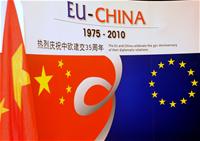A return to the era of the beast
Adelina Marini, January 12, 2011
 Two information lines occupy my mind these days. Furthermore, they very closely intertwine and the consequences of this interweaving are still too early to predict. The first line is the tension in the South China Sea which provoked many analysts in the end of last year to talk about a new arms race in the Asia-Pacific region. The second plot, still in development, is the readiness of China, and as of yesterday (January 11th) of Japan too, to start buying euro bonds in the end of January when they will be released for auction.
Two information lines occupy my mind these days. Furthermore, they very closely intertwine and the consequences of this interweaving are still too early to predict. The first line is the tension in the South China Sea which provoked many analysts in the end of last year to talk about a new arms race in the Asia-Pacific region. The second plot, still in development, is the readiness of China, and as of yesterday (January 11th) of Japan too, to start buying euro bonds in the end of January when they will be released for auction.
Economic might, furred with military means
Globalised economy has changed significantly global landscape of influence, which has its own logical consequences. For example, since recently, China has started dressing its economic might up with military robes which caused outbursts of strong fear and counter reactions in South-East Asia, as far to the shores of the United States. The first aspect of Chinese military modernisation is the creation of a programme for aircraft carriers, and the second is the development of the first in the world anti-ship ballistic missile. Moreover, China held yesterday the first tests of a Chinese stealth aircraft. All this is happening against the backdrop of the tension on the Korean peninsula.
By the way, an interesting moment in learning about this project is that it was confirmed by President Hu Jintao himself in the presence of Robert Gates, US's Secretary of Defense, who was on a visit in China. Besides, China last year held exercises in South China Sea which provoked the US to respond by redirecting the George Washington aircraft-carrier to the region. Also in the end of last year Japan reacted sharply to Beijing's intentions to modernise its army and announced its own national defence plan which would practically lead to amendments of the Constitution of the country, created after the World War II and forbidding Japan to possess greater military capacity than necessary for self-defence.
According to Tokyo, however, given the developments in the region, it would be necessary for Japan to be ready. In the upcoming years the country will dispose new submarines, destroyers and fighters to cover the sea approaches to the south Japanese islands, including Okinawa - a region which is currently a subject of severe Sino-Japanese clashes on sea rights.
Projection of Sino-Japanese scuffling on the EU
The European Union has no luck lately. In fact, it has no luck ever since it has started its broad enlargement to the East. This forced the largest economic power in the world (for now) to fall into self-observation and search for a solution how to make its ever more clumsy machine to start working to increase its global influence. But this self-observation took almost 10 years before crystallising into the Lisbon Treaty which, on its part, solved some problems but cannot solve others, yet quite fundamental ones.
For example, the Lisbon Treaty does not provide for saving the euro area in case members of its start falling like ripe pears under the weight of their own debts. This is why member states' leaders had to urgently start thinking how to exit this situation by even agreeing to slight amendments of the Treaty on Functioning of the EU, with which to partially solve the problems. This, however, is expected to take no less time than the Lisbon Treaty took (in terms of global developments which constantly put pressure on the euro area).
All of a sudden China emerged to help - the country with the largest currency reserves in the world. Yet in the summer of 2010 China stepped on an extremely geostrategic place by offering to buy off the debt of a candidate country for EU membership - Iceland. Not much later Beijing politely offered its services to Greece and then to Portugal and Spain. For now no one in the EU objected these moves but  Japan made another move by announcing yesterday its decision to buy 20% of the bonds which the European Stability Facility (EFSF) would release in the end of the month.
Japan made another move by announcing yesterday its decision to buy 20% of the bonds which the European Stability Facility (EFSF) would release in the end of the month.
Last month the European Commission announced it planned to collect up to 16.5bn euros to finance the Irish bail-out plan. Euro bonds worth 3 and 5bn euros will be auctioned which means that Japan will spend more than a billion euros in order to possess European debt. The expectations that Portugal too will request soon assistance from euro area's rescue mechanism are growing stronger, but for now are being denounced. Japan also refrained from mentioning Portugal when announcing its plans on January 11th, the Irish Times wrote, quoting the Bloomberg. By the way Japan has the second largest currency reserves in the world, after China.
In the end of December China announced that it was ready to buy Portuguese debt worth 6.6bn euros. The same amount of money Beijing signaled to be ready to pay for Spanish government bonds.
Beast's behaviour
In fact, none of the above would have caused concern if the currency wars were not a fact and if the Sino-American tension had not increased in the past two years, to some extent due to the Asian giant's growing influence, having huge dollar reserves in its central bank. It is these reserves that Beijing uses as a major weapon in its diplomacy against the US. And against the backdrop of the contracting American influence (because of the unconvincing exit from the recession, the high unemployment and the stalemate situation in the American Congress), the EU is unlikely to have a lot of reasons to be happy that it finally found a financial savior that could take the eurozone out of the abyss.
Besides, buying off European debts would not have been a problem also if the rules of world trade were applied by everyone and foreign investors were treated in balance everywhere. However, the case of China is different, as the Director of the Centre for European Reform, Charles Grant, tells in details. He writes about his visit in China more than a year ago where he was impressed by the strong feeling of many foreign companies of deterioration of the business environment in the country. Most Western businessmen complained of discrimination against foreigners, especially in terms of participation in public procurement competitions.
And one more very important thing - in some sectors, especially those related to intellectual property, foreign companies complain more and more often that they were being forced to transfer know-how to Chinese firms in return for market access. In November 2009 the government in Beijing introduced a measure to regulate "indigenous innovations". If this measure enters into force, it would exclude foreign companies from taking part in public procurement unless they agree to transfer their intellectual property.
 The problem of access to public procurement in China as well as the equal treatment of Chinese and foreign companies was again raised during the summer Davos in China, during which premier Wen Jiabao said that for China all companies were equal. According to Charles Grant China still welcomed foreign direct investments but was growing more insisting on setting the terms. This is why Mr Grant entitled his analysis precisely: "Is China being beastly to foreign investors?"
The problem of access to public procurement in China as well as the equal treatment of Chinese and foreign companies was again raised during the summer Davos in China, during which premier Wen Jiabao said that for China all companies were equal. According to Charles Grant China still welcomed foreign direct investments but was growing more insisting on setting the terms. This is why Mr Grant entitled his analysis precisely: "Is China being beastly to foreign investors?"
The question maybe should now be - Is China being beastily to the rest of the world - greedily striving to swallow it?
 Angela Merkel, Emmanuel Macron | © Council of the EU
Angela Merkel, Emmanuel Macron | © Council of the EU Benoit Coeure | © Council of the EU
Benoit Coeure | © Council of the EU Pierre Moscovici | © Council of the EU
Pierre Moscovici | © Council of the EU